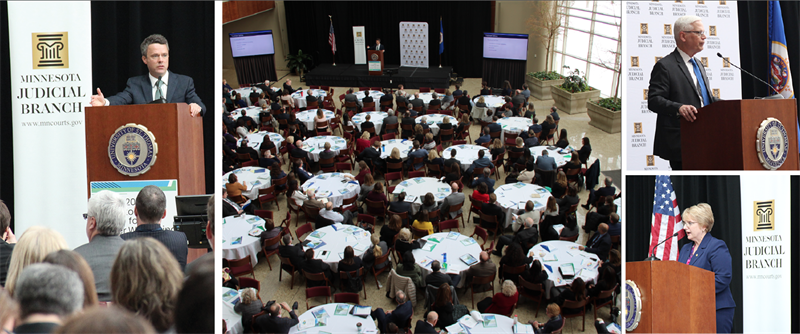
National efforts to advance well-being in the legal profession were placed under a statewide spotlight at the Minnesota Supreme Court’s Call to Action for Lawyer Well-Being conference on February 28. Nearly 250 representatives from a range of legal employers were invited to discuss the data and recommendations from The Path to Lawyer Well-Being: Practical Recommendations for Positive Change,1 a groundbreaking 2017 report issued by The National Task Force on Lawyer Well-Being.2 These efforts followed the 2016 release of updated data showing high levels of problematic substance use, mental health issues, and stigma in our profession.3
In introducing the conference, Minnesota Supreme Court Chief Justice Lorie S. Gildea said, “The report makes it clear that the legal profession is in serious need of self-reflection, healing, and meaningful change. If we fail to respond to these devastating levels of mental and chemical health issues, we risk our profession’s reputation, the public’s trust in the legal profession, and the ability to attract bright young minds to the profession.”
Chief Justice Gildea then introduced Patrick Krill, a co-author of the study detailing substance use and mental health issues in the legal profession and a national consultant on lawyer well-being. In his keynote address, Krill identified reasons that the entire profession should be paying close attention to and acting on this research. They included the costs to legal organizations and those who are personally affected by these issues; the importance of reducing stigma and acting quickly; and the positive path that can result from engaging on these issues.
Breakout sessions
The attendees then joined four breakout groups focused, respectively, on large firms, solo and small firms, judges and public lawyers, and in-house counsel. Each group discussed specific opportunities and challenges in creating greater awareness and implementing well-being options within their spheres. Attendees were encouraged to analyze their work environments for opportunities and to review and adopt a well-being pledge.
Following the breakouts, Associate Justice David Lillehaug introduced the second keynote speaker, Anne Brafford. Brafford, a member of the national task force and the author of the Path to Lawyer Well-Being Toolkit,4 addressed the nexus between well-being and personal peak performance. She stressed that legal organizations and their leaders play an enormous role in whether lawyers feel engaged or depleted and burned out, and offered science-based organizational strategies to fix problems that harm lawyer well-being.
Justice Lillehaug closed the conference with a challenge. “The Court hopes that all participants heard our call,” he said, “and left inspired to take concrete steps to encourage wellness. We’ll be following up with them over the next year.” As its first next step, the Supreme Court has created a webpage featuring conference materials and videos of the keynotes at www.mncourts.gov/lawyer-well-being.aspx.
LCL can help
Lawyers Concerned for Lawyers (LCL) was delighted to be involved in planning this conference and is grateful to the Supreme Court for raising the profile of these issues. For 42 years, LCL has assisted individuals and organizations in the legal profession to recognize issues of impairment and to support our colleagues as they seek the help they need. Since the publication of the well-being report in August 2017, LCL has provided dozens of CLE and other programs and has participated in many discussions with employers about implementing these recommendations in their organizations.
LCL can be a resource for beginning or for continuing discussions on how to support our colleagues so we can do our best thinking. Well-being efforts are not optional; theare critical to retention, business success, effective diversity and inclusion initiatives, reduced risk of ethics and malpractice issues, client and lawyer satisfaction, personal resilience, organizational health, and the reputation of our profession.
Notes
1 http://ambar.org/lawyerwellbeingreport
2 The National Task Force on Lawyer Well-Being is a coalition of entities, including the American Bar Association and representatives of lawyer assistance programs.
3 P. R. Krill, R. Johnson, & L. Albert, “The Prevalence of Substance Use and Other Mental Health Concerns Among American Attorneys,” 10 J. ADDICTION MED. 46 (2016); J. M. Organ, “What Do We Know About the Satisfaction/Dissatisfaction of Lawyers? A Meta-Analysis of Research on Lawyer Satisfaction and Well-Being,” 8 U. ST. THOMAS L. J. 225 (2011).
4 http://ambar.org/wellbeingtoolkit.
JOAN BIBELHAUSEN is the executive director of Lawyers Concerned for Lawyers (LCL). You can find more information on Lawyers Concerned for Lawyers at www.mnlcl.org. LCL may be reached, confidentially, at 651-646-5590 or help@mnlcl.org.